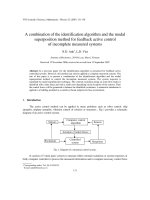Verbs of incomplete predication
Bạn đang xem bản rút gọn của tài liệu. Xem và tải ngay bản đầy đủ của tài liệu tại đây (8.55 KB, 1 trang )
Verbs of incomplete predication
Intransitive verbs
do not take an object. Examples are given below.
Fire
burns.
He
sat
on the floor.
The old man
laughed.
Some
intransitive verbs
require a word or phrase to complete the predicate and make sense of the sentence.
Such verbs are called verbs of incomplete predication. Examples are:
is, am, are, was, were, become, look,
seem, appear, taste, smell, grow, turn
etc.
The earth
is round
.
Honey
tastes sweet.
The milk
turned sour.
He
became a monk.
The night
grew dark.
The word or words required to complete the predicate is called the complement of the verb. In the above
sentence, the words
round, sweet, sour, monk and dark
are the complements of the verbs
is, tastes, turned,
became and grew
respectively.
When the complement of a verb says something about the subject, it is called a
subject complement.
Read the following sentence.
Susie is a writer.
Here the noun ‘writer’ is the complement of the verb ‘is’. As it says something about the subject Susie, it is a
subject complement.
More examples are given below.
She is intelligent. (Subject complement – intelligent)
This house is to let. (Subject complement – to let)
The child continued crying. (Subject complement – crying)
She looked depressed. (Subject complement – depressed)
Object complements
Transitive verbs have objects, but some transitive verbs require, besides their objects, some complements to
complete their meaning.
The teacher appointed Charles monitor.
They elected Ram their president.
Frustration drove him mad.
They named her Angel.
Here the complements monitor, president, mad and Angel say something about the objects Charles, Ram, him
and her. A complement which says something about the object is called an
object complement.
Be first to know when grammar rules change! Sign up to our newsletter here: englishgrammar.org (It's free)
Powered by TCPDF (www.tcpdf.org)









